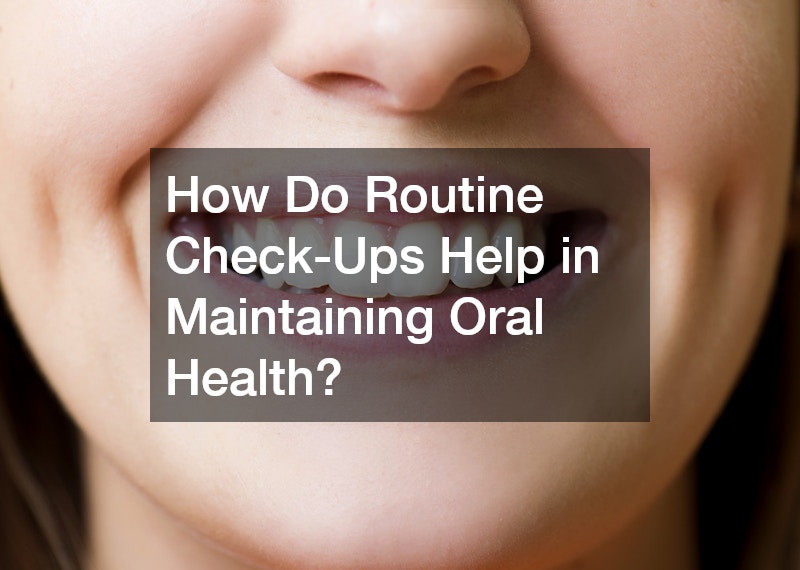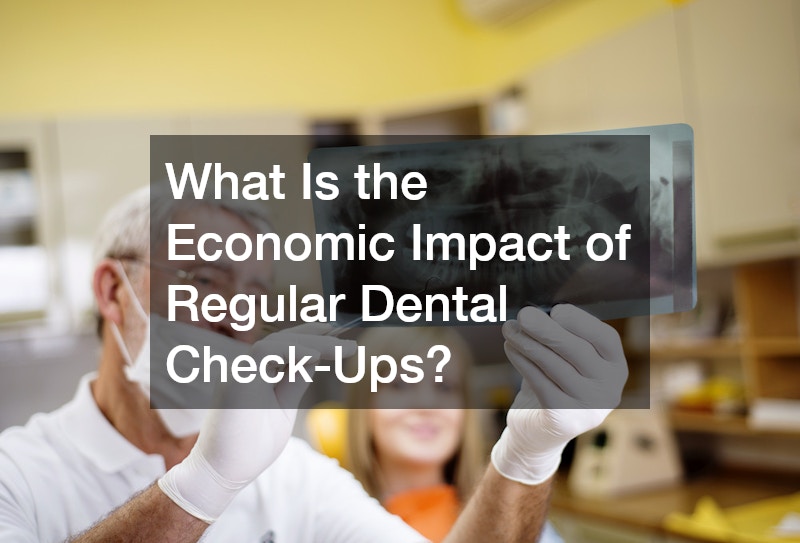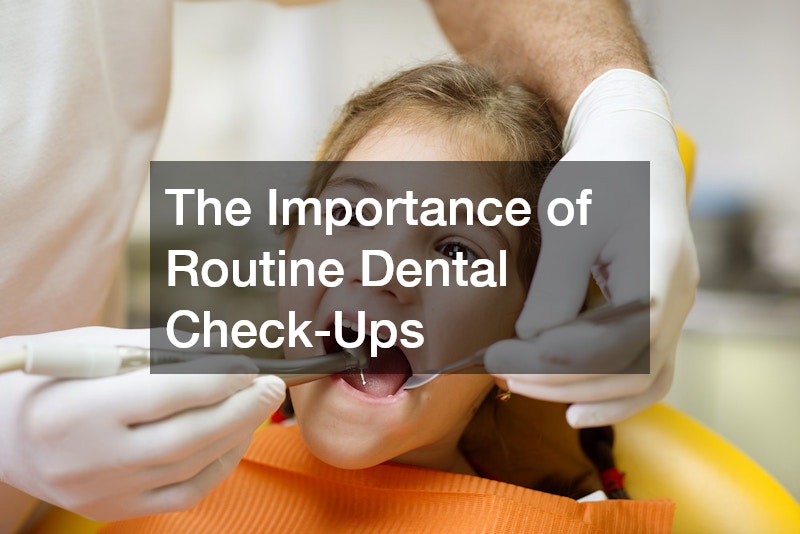
Routine dental check-ups are essential for maintaining both oral health and overall well-being. Just like a doctor, regular visits to the dentist can help detect issues early on, prevent diseases, and offer professional guidance on personal oral care. In addition, routine dental appointments often serve as a window to your overall health, enabling dentists to spot signs of underlying health issues that may need further medical evaluation. This article delves into the significance of routine dental check-ups and explores various facets, from disease prevention to the role of regular visits in aesthetics and economic benefits.
Why Are Dental Check-Ups Necessary?
Routine dental check-ups provide numerous benefits, from preventing dental issues to ensuring personalized care tailored to each patient’s needs. They form the foundation of good oral health, leading to a happier, healthier life.
Preventing Dental Diseases
Regular dental visits are crucial for detecting and preventing various dental diseases, including cavities, gum disease, and oral infections. By addressing issues before they become severe, routine dental check-ups play an essential role in safeguarding one’s teeth and gums. Preventive care, such as professional teeth cleaning, helps remove plaque and tartar buildup, reducing the risk of cavities and other issues.
Early Detection of Oral Health Issues
Routine dental visits allow for early detection of various dental problems, including tooth decay, gum disease, and even signs of oral cancer. Early detection means treatment can start promptly, minimizing discomfort, cost, and complexity. A dentist may also identify conditions related to lip ties or other oral anatomical concerns that impact oral function, especially in children.
Maintaining Oral Hygiene
A strong oral hygiene routine is essential, but it’s not always enough. Routine dental check-ups provide patients with a deep-cleaning session and guidance on improving their daily habits. By following professional advice, patients can optimize their hygiene practices to prevent dental issues over the long term.
Professional Dental Cleaning
Professional cleaning at the dentist’s office is more thorough than at-home brushing and flossing. Dental hygienists are skilled at removing hardened plaque (tartar) that regular brushing can’t reach. Additionally, professional cleaning sessions can help reduce stains on teeth, which contributes to a brighter, cleaner smile.
Personalized Oral Care Tips
Every patient has unique dental needs, so routine check-ups provide a valuable opportunity to receive personalized advice. A dentist or hygienist may offer tips on brushing techniques, discuss specific concerns like lip filler treatments, or address personal oral health habits. This advice helps patients take proactive steps to maintain optimal oral health.
How Often Should You Visit the Dentist?
The frequency of dental visits can vary depending on individual needs, risk factors, and age. A dentist will often recommend a suitable schedule based on these factors to keep the patient’s teeth and gums in the best condition.

General Recommendations
Most people should visit the dentist at least twice a year for a routine dental check-up. These biannual visits allow for timely cleanings, check-ups, and preventive care to minimize the likelihood of dental issues.
Frequency for High-Risk Patients
For individuals at higher risk of dental issues, more frequent visits may be necessary. People with a history of gum disease, those with a high risk of cavities, and individuals who have received dental implants might need to see their dentist more often to monitor their condition closely.
Impact of Age on Frequency
Children, who are prone to cavities, may need to see a pediatric dentist every six months. Conversely, elderly patients may need more frequent visits to address concerns like dry mouth, tooth wear, or other age-related dental issues.
Adjustments Due to Lifestyle Factors
Lifestyle factors like smoking, diet, and oral hygiene habits can influence the frequency of dental visits. Smokers and individuals with high sugar intake may need to see the dentist more frequently to mitigate the increased risks of cavities and gum disease.
Signs That an Additional Visit Is Needed
Unusual symptoms such as tooth pain, gum bleeding, or bad breath should not be ignored. If any of these arise between scheduled visits, it’s best to make an additional appointment with the dentist to address the issue before it worsens.
What to Expect During a Dental Check-Up?
Dental check-ups involve multiple steps, each aimed at ensuring comprehensive care for the patient’s oral health.
Initial Examination
The dental visit typically starts with an initial examination, where the dentist or hygienist inspects the patient’s mouth for signs of decay, gum disease, or any abnormalities. This examination helps identify issues that may require further attention.
Dental X-Rays
X-rays are often taken during a routine dental check-up, especially for new patients or those due for a closer evaluation. X-rays help detect problems that may not be visible to the naked eye, such as cavities between teeth or issues below the gumline.
Professional Cleaning
As part of the check-up, the hygienist performs a thorough cleaning, using special tools to remove plaque and tartar. Regular cleanings can also help prevent gum disease, ensuring that the teeth and gums remain healthy.
Dentist’s Evaluation
After the hygienist’s cleaning, the dentist examines the patient’s mouth and reviews any X-rays taken. This evaluation allows the dentist to assess overall oral health, address concerns, and recommend any additional treatments if necessary.
Post-Examination Consultation
The final step involves discussing any findings, dental care tips, and treatment recommendations. This consultation is an opportunity to address specific needs and establish a care plan to maintain oral health.
What Should You Do to Prepare for a Dental Appointment?
Preparation can help ensure a smooth and productive visit, allowing the patient to address all concerns and make the most of the appointment.
Hygiene Prior to Visit
Patients should brush and floss thoroughly before their appointment to help the dentist evaluate a clean mouth. Good hygiene also reflects commitment to routine dental care, which is a cornerstone of oral health.
Medical History Updates
It’s essential to provide the dentist with an updated medical history and inform them of any medications, recent health issues, or allergies. This information helps the dentist make informed decisions, especially if certain treatments or injectable treatments are under consideration.
List of Concerns
Patients may have specific concerns, such as sensitivity or questions about cosmetic procedures like lip filler. Writing these down beforehand ensures these topics are discussed during the consultation.
Insurance and Payment Preparation
Understanding insurance coverage and preparing for payment options can make the visit smoother. Many dental offices offer a range of financing options, so discussing these in advance helps streamline the process.
Questions to Ask
Prepare questions about oral care, procedures, or specific conditions such as lip ties. Having a list of questions ready allows patients to gain clarity and take advantage of the dentist’s expertise.
How Do Routine Check-Ups Help in Maintaining Oral Health?
Dental visits are essential for preserving oral health, detecting potential issues, and maintaining natural teeth for life.

Identifying Plaque and Tartar
Routine visits help identify plaque and tartar build-up that brushing and flossing can’t always remove. Regular removal of these buildups keeps teeth clean and minimizes the risk of decay.
Preventing Gum Disease
Dental care is crucial for preventing gum disease, which can lead to tooth loss if untreated. Early-stage gum disease can be reversed with proper care, making regular check-ups essential for gum health.
Addressing Bad Breath
Persistent bad breath may be a sign of a dental issue, such as decay or infection. Routine check-ups help diagnose the cause of bad breath and provide effective solutions.
Preserving Natural Tooth Structure
Regular cleanings and timely intervention can help preserve natural tooth structure by addressing issues like decay early on, reducing the need for restorative treatments in the future.
Comprehensive Oral Care Education
Dental visits allow for ongoing education about dental care. Dentists and hygienists can provide personalized guidance, reinforcing the importance of a solid oral hygiene routine.
Can Dental Visits Prevent Serious Health Issues?
Oral health is often linked to overall health, and routine check-ups play a vital role in detecting early signs of systemic health problems.
Link Between Oral and Systemic Health
Research has shown a link between oral health and systemic conditions, such as cardiovascular disease and diabetes. Regular dental visits help maintain oral health and support overall health.
Detecting Signs of Diabetes
Gum disease may be an early indicator of diabetes. During routine visits, the dentist can look for signs of gum issues and recommend further testing if necessary.
Indicators of Heart Disease
Inflammation in the gums may reflect inflammation elsewhere in the body, including the heart. Regular dental care helps reduce gum inflammation, potentially lowering the risk of cardiovascular complications.
Oral Cancer Screening
Routine dental visits often include an oral cancer screening. Early detection of oral cancer significantly increases treatment success, making regular check-ups essential for overall health.
Impact on Respiratory Health
Poor oral health, particularly gum disease, has been linked to respiratory issues. Maintaining good oral hygiene through regular check-ups can help reduce the risk of respiratory infections.
What Role Do Routine Visits Play in Aesthetics?
Dental visits contribute to the aesthetic aspect of oral health, ensuring a bright and confident smile.
Whitening Treatments
Dentists can provide professional teeth whitening treatments, enhancing the appearance of the smile and boosting confidence.
Orthodontic Observations
Routine dental visits also allow for regular monitoring of tooth alignment. Referrals to an Orthodontist can be made if necessary to improve bite and aesthetics.
Cosmetic Dentistry Advice
For patients considering aesthetic procedures that must be done by a cosmetic dentist, routine visits provide an opportunity to discuss options and obtain professional recommendations.
Ensuring Symmetrical Tooth Alignment
Regular visits can help maintain symmetrical tooth alignment by catching early signs of misalignment, preventing the need for more invasive treatments.
Analysis of Facial Proportions
Dentists are skilled in evaluating facial proportions and can recommend procedures, such as orthodontics or even cosmetic options, to enhance overall facial harmony.
How Do Routine Check-Ups Benefit Children?
Dental check-ups are crucial for children, helping to establish lifelong habits and detect issues early on.

Monitoring Growth and Development
Pediatric dentists can monitor the growth and development of a child’s teeth, ensuring that any abnormalities are addressed early.
Establishing Good Oral Habits
Routine visits instill good oral hygiene habits in children, teaching them the importance of brushing, flossing, and regular dentist visits.
Early Orthodontic Assessment
A pediatric dentist can assess a child’s need for orthodontic treatment early on, guiding parents through the process if braces or other treatments are recommended.
Preventing Childhood Cavities
Children are often more susceptible to cavities. Regular check-ups with a pediatric dentist help catch cavities early and prevent them from becoming painful issues.
Educating Children on Dental Care Importance
Routine visits provide a foundation for children to understand the value of oral health and its impact on their overall well-being.
How Can Fear of Dental Visits Be Managed?
Dental anxiety is common, but there are strategies to make the experience more comfortable.
Understanding Dental Anxiety
Recognizing the causes of dental anxiety is the first step in managing it. Dentists often use gentle communication to ease patients’ fears.
Communication Techniques
Dentists and hygienists are trained in communication techniques that help patients feel at ease. Clear explanations and a reassuring tone can reduce anxiety.
Sedation Dentistry Options
For those with severe anxiety, sedation dentistry offers a way to relax during procedures, ensuring that routine dental care isn’t neglected.
Creating a Calm Environment
Many dental offices provide a relaxing environment to make patients more comfortable. Soothing music, warm blankets, and friendly staff can all contribute to a positive experience.
Exposure Therapy and Desensitization
Gradual exposure to the dental office can help desensitize patients to their fear. Repeated positive experiences can lead to a reduction in anxiety over time.
What Is the Economic Impact of Regular Dental Check-Ups?
Routine dental visits not only benefit health but can also have significant economic advantages over the long term.

Cost-Benefit Analysis
Preventive care often costs less than emergency treatments. Regular check-ups allow patients to avoid expensive procedures by catching problems early.
Insurance Coverage and Plans
Most dental insurance plans cover routine check-ups, making preventive care affordable. Patients should understand their coverage to maximize benefits.
Long-Term Savings
By preventing serious dental issues, routine visits can save money in the long run by reducing the need for costly procedures.
Routine dental check-ups are essential for maintaining oral and overall health, preventing disease, and providing early detection of serious health issues. From aesthetic improvements to economic savings, the benefits of dental visits extend well beyond a healthy smile. By making regular dental care a priority, patients can enjoy lasting health, improved confidence, and peace of mind, knowing they’re taking proactive steps in safeguarding their well-being.

